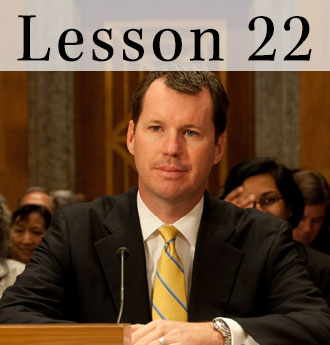Lesson 22: What is the role of the United States in the world today?
de San Martin, Jose (1778-1850) Jose de San Martin helped lead the revolutions against Spanish rule in Argentina (1812), Chile (1818), and Peru (1821). The boldness of his plan to attack the viceroyalty of Lima by crossing the Andes to Chile and going on by sea, as well as the patience and determination with which he executed it, was likely the decisive factor in the defeat of Spanish power in South America.
Hidalgo, Miguel (1753-1811) Miguel Hidalgo y Costilla was a Mexican Catholic priest. On September 16, 1810, Father Hidalgo rang the church bell to announce revolution against the Spanish. Indians and mestizos marched with Hidalgo and captured major cities but were halted at the gates of the capital. Hidalgo fled north but was caught and shot in 1811. The anniversary of his call is celebrated as Mexico's Independence Day.
Locke, John (1632-1704) John Locke, a physician and philosopher, worked with famous scientists, including Robert Boyle and Robert Hooke. In contrast to Hobbes, Locke used state of nature and social contract theory to justify limited government and the preservation of individual rights, particularly life, liberty, and property. Locke is sometimes called "America's philosopher" because his Second Treatise of Government (1690) was widely read by the colonists and important ideas found in it (as well as in works of English republican writers) are found in the Declaration of Independence, especially his theories of natural rights and his defense of violent revolution after "a long train of abuses" of power by rulers. Two verbatim phrases of Locke's are found in the Declaration.
Montesquieu (1689-1755) (Charles-Louis de Secondat, Baron de La Brede et de Montesquieu) Montesquieu was a French lawyer, nobleman, author, and political philosopher. He is recognized as one of greatest thinkers of the Enlightenment. Montesquieu first gained fame for a satire, The Persian Letters, in 1721, which pointed out the absurdities of modern European, especially French, life. He also published Considerations of the Causes of the Greatness of the Romans and of their Decline (anonymously) in 1734. His masterpiece, The Spirit of the Laws (1748), greatly influenced political thought in Europe and America and was placed on the Index of Forbidden Books by Catholic Church because of its "liberal" views.
O'Higgins, Bernardo (1778-1842) Bernardo O'Higgins was a Chilean landowner, general, president, and one of the leaders of its struggle for independence. Although he had no formal military training, O'Higgins took charge of the ragged rebel army and fought the Spanish from 1810 to 1818, when Chile achieved its independence. Today, he is revered as the liberator of Chile and the father of the nation.




